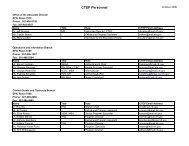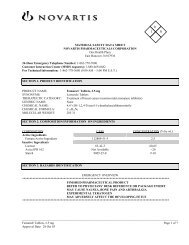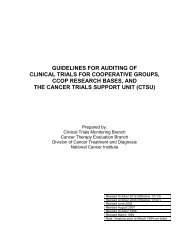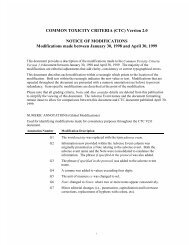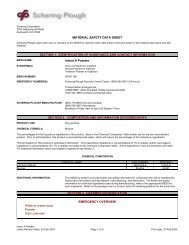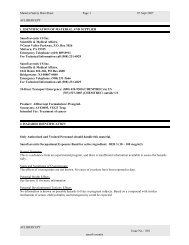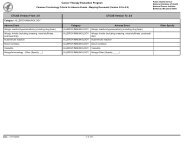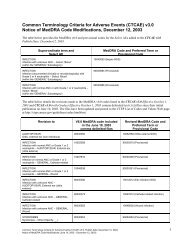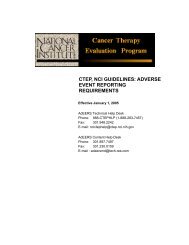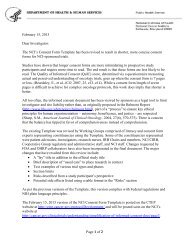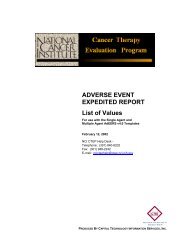NCI National Clinical Trials Network (NCTN) Program Guidelines
NCI National Clinical Trials Network (NCTN) Program Guidelines
NCI National Clinical Trials Network (NCTN) Program Guidelines
You also want an ePaper? Increase the reach of your titles
YUMPU automatically turns print PDFs into web optimized ePapers that Google loves.
PART 2: Submission of New/Competing Application Section III.B.2.6 – Review Criteria<br />
Canadian Collaborating <strong>Clinical</strong> <strong>Trials</strong> <strong>Network</strong><br />
Approach<br />
Are the overall strategy, methodology, and analyses well-reasoned and appropriate to<br />
accomplish the specific aims of the proposed Canadian Collaborating <strong>Clinical</strong> <strong>Trials</strong><br />
<strong>Network</strong>? Are potential problems, alternative strategies, and benchmarks for success<br />
presented? If the project is in the early stages of development, will the strategy<br />
establish feasibility and will particularly risky aspects be managed?<br />
Since the proposed Canadian Collaborating <strong>Clinical</strong> <strong>Trials</strong> <strong>Network</strong> will conduct clinical<br />
research, are the plans for 1) protection of human subjects from research risks, and 2)<br />
inclusion of minorities and members of both sexes/genders, as well as the inclusion of<br />
children, if applicable, justified in terms of the scientific goals and research strategy<br />
proposed?<br />
Environment<br />
Will the scientific environment in which the work will be done contribute to the<br />
probability of success? Are the institutional support, equipment and other physical<br />
resources available to the investigators adequate for the project proposed? Will the<br />
clinical research conducted by the proposed Canadian Collaborating <strong>Clinical</strong> <strong>Trials</strong><br />
<strong>Network</strong> benefit from unique features of the scientific environment, subject<br />
populations, or collaborative arrangements?<br />
Additional Review Criteria - Overall<br />
As applicable for the research that the Canadian Collaborating <strong>Clinical</strong> <strong>Trials</strong> <strong>Network</strong><br />
applicant has proposed, reviewers will evaluate the following additional items A-C<br />
listed below while determining scientific and technical merit, and in providing an<br />
overall impact/priority score, but will not give separate scores for these items.<br />
2.6.3 Additional Review Item A - <strong>Clinical</strong> Trial Development & Member Site Accrual <strong>Program</strong><br />
Overall Research Strategy: Does the applicant articulate a clear, well-developed,<br />
overall research strategy to achieve the stated clinical research goals with respect to<br />
complementing the research of the U.S. <strong>Network</strong> Groups of the <strong>NCTN</strong> <strong>Program</strong>? Is<br />
the research strategy for complementing research activities of the <strong>NCTN</strong> <strong>Program</strong><br />
practical and feasible? Are the disease areas included in the applicant’s overall<br />
research strategy appropriate and beneficial to the <strong>NCTN</strong>? How well would the<br />
applicant contribute to the development of and/or accrual to clinical trials in rare<br />
cancers?<br />
<strong>Clinical</strong> Trial Quality: Do the clinical trials currently being conducted as well as those<br />
proposed by the applicant address important clinical treatment questions based on<br />
strong hypotheses and preliminary data and indicate that the applicant can contribute<br />
meaningfully in the <strong>NCTN</strong>? Do the trials use scientifically rigorous approaches to trial<br />
design with use of innovative approaches as appropriate and with sound justification?<br />
Do the trials contain integral and integrated translational science research questions<br />
that are appropriate and well-justified to answer specific research questions? Is the<br />
past record of results from the trials completed by the applicant scientifically<br />
important? Do these results provide new information that advances the field and<br />
provide guidance for future trials? Will (or have) the results lead (led) to meaningful<br />
practice changes for cancer care, supported FDA approvals of oncologic drugs or<br />
devices, changes in practice guidelines, or other meaningful impacts (e.g., phase 2<br />
trials leading to phase 3 trials conducted by government or private sector, provision of<br />
important toxicity or dosing information)? Does the applicant's record of past results<br />
Page 178 of 241



